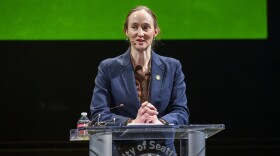Vice President Kamala Harris visited Seattle on Wednesday to highlight Biden-administration programs to provide cleaner and greener infrastructure for public schools. A centerpiece of that is a $5 billion, five year plan focused on school buses.
Michael Regan, administrator of the Environmental Protection Agency, traveled with Harris. He helped announce a first round of rebates, awarded to hundreds of school districts nationwide. They’ll replace older diesel vehicles with cleaner alternatives.
Nearly 400 school districts spanning all 50 states and Washington, D.C., along with several tribes and U.S. territories, are receiving roughly $1 billion in grants to purchase about 2,500 “clean” school buses under the new federal program.
Regan told KNKX the older buses emit large amounts of pollutants, such as nitrogen oxides and particulates, that are linked to asthma and other serious health problems.
"Not only are these pollutants harmful to the environment, but they're also harmful to our children's health. While EPA has implemented standards to make newer diesel engines much cleaner, many older diesel school buses are still operating," he said.
Only about 1% of the nation’s 480,000 school buses were electric as of last year, but the push to abandon traditional diesel buses has gained momentum in recent years.
As many as 25 million children ride yellow buses each school day, Harris said during the event held at Seattle's Lumen Field.
“The clock is ticking loudly. We are witnessing around our country and around the world the effects of extreme climate,” she said, standing in front of yellow electric school buses.
“What we’re announcing today is a step forward in our nation’s commitment to reduce greenhouse gases, to invest in our economy ... to invest in building the skills of America’s workforce. All with the goal of not only saving our children, but for them, saving our planet.''
Harris appeared in Seattle with fellow Democrats U.S. Senator Patty Murray and Gov. Jay Inslee. Murray worked with Harris on the clean school bus legislation, which is part of the federal infrastructure law that passed last year.
After the Lumen Field event, Harris attended a private fundraiser for Murray. Washington's long-time senator is in a tightening race for re-election against Republican challenger Tiffany Smiley.
In a recent debate, Smiley declined to say whether she thought climate change was caused by human actions.
The EPA initially made $500 million available for clean buses in May but increased that to $965 million last month, responding to what officials called overwhelming demand for electric buses. An additional $1 billion is set to be awarded in the budget year that began Oct. 1.
The EPA said it received about 2,000 applications requesting nearly $4 billion for more than 12,000 buses, mostly electric. A total of 389 applications worth $913 million were accepted to support purchase of 2,463 buses, 95% of which will be electric, the EPA said. The remaining buses will run on compressed natural gas or propane.
School districts identified as priority areas serving low-income, rural or tribal students make up 99% of the projects that were selected, the White House said. More applications are under review, and the EPA plans to select more winners to reach the full $965 million in coming weeks. The administration is encouraging school districts throughout the U.S. to apply for future grant rounds.

Districts set to receive money range from Wrangell, Alaska, to Anniston, Alabama, and Teton County, Wyoming, to Wirt County, West Virginia. Besides the District of Columbia, big cities that won grants for clean school buses include New York, Dallas, Houston, Atlanta and Los Angeles.
One of the local school districts that recently got an electric bus is on Whidbey Island. Audrey Gmerek, a junior at South Whidbey High, introduced the vice president.
"With bias, I have to say we might have the most beautiful bus rides in the nation. Students, however, have been directly impacted by the environmental deterioration and health concerns caused by the air pollution caused by these diesel guzzling buses," Gmerek said.
White House adviser Mitch Landrieu said he expects many buses to be delivered by the start of the next school year, with the remainder likely to be in service by the end of 2023. The billion dollars being spent this year — along with an additional $4 billon expected over the next four years — should “supercharge” a domestic manufacturing boom for electric school buses, said Landrieu, a former New Orleans mayor tapped by Biden to oversee spending in the massive infrastructure law.
“These buses will be made in America — real jobs with real wages,″ Landrieu said in an interview. “We are going to ramp up manufacturing in this country.″
Environmental and public health groups hailed the announcement, which comes after years of advocacy to replace diesel-powered buses with cleaner alternatives.
“It doesn’t make sense to send our kids to school on buses that create brain-harming, lung-harming, cancer-causing, climate-harming pollution,'' said Molly Rauch, public health policy director for Moms Clean Air Force, an environmental group. "Our kids, our bus drivers and our communities deserve better.''
Bellamy Pailthorp, Scott Greenstone and The Associated Press contributed to this report.








